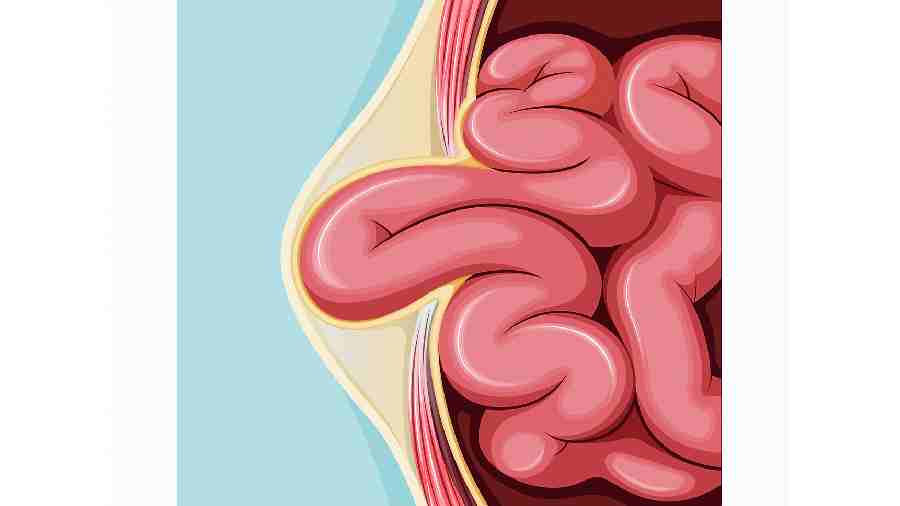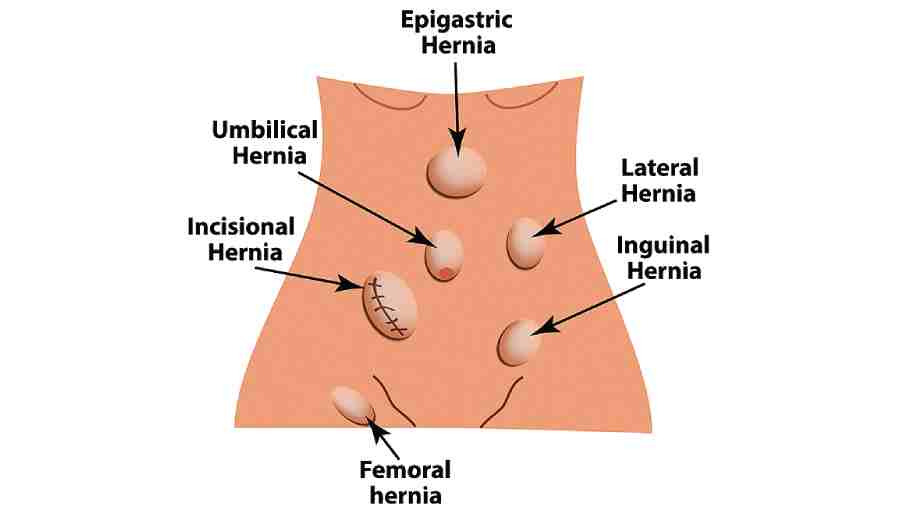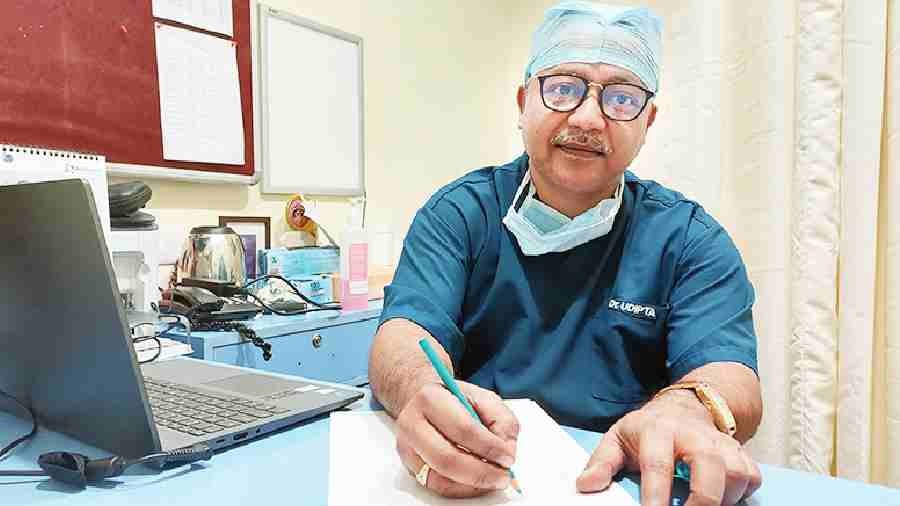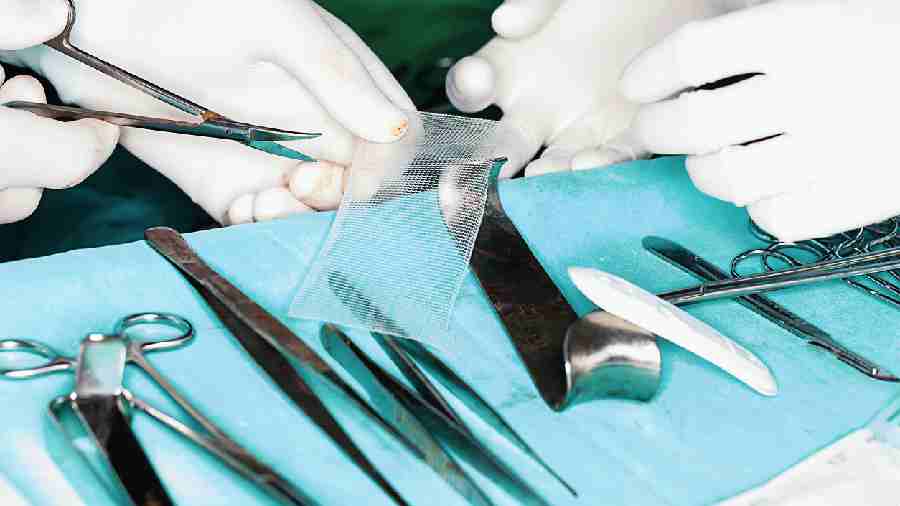What is hernia?
A hernia is a condition when an organ or tissue tries to protrude out of a body cavity through a weakness in the wall of the cavity. A hernia occurs when the protective membrane surrounding a organ is weak and develops tears or holes. It may be caused by a weak muscle wall through which an organ tends to come out
How common is hernia?
Hernias are fairly common in India. The chance of hernia is at least 25 per cent in males in a lifetime. On an average, 10-12 per cent of any adult population in our country suffers from some hernia problem or the other, however hernias are also seen in newborn as a developmental defect. We have a large population above the age of 70 years where hernias maybe as common as one in three to four individuals .
What are the different types of hernia?
Based on the site , the common hernias are the hernias of the groin, of the belly button, in the tummy, above or below the belly button and at the scars of previous surgery. Hernias can appear spontaneously or as a developmental defect, the classical examples of which are the groin hernias in the elderly and the newborn respectively.
What are the symptoms of a hernia?
In a newborn, a hernia at the groin or the naval is usually noticed by the mother who reports a swelling at those places which become more prominent when the baby or child cries or jumps or runs and plays and becomes less prominent when the child lies down or goes to sleep. In adults too, a hernia usually develops as a swelling beneath the skin of the abdomen or the groin, initially appearing during straining or walking or coughing and disappearing on lying down. There is a heavy feeling which increases with constipation. However hernias in the elderly may be associated with prolonged coughing, difficulty in passage of urine and stool and muscle weakness, specially of the lower part of the tummy .
Why do hernias form?
Hernias form as a result of muscle weakness or a defect in the wall of the body cavity. They can be a defect from birth or more commonly an acquired defect later on in life due to wear and tear of muscles and age-related muscle weakness. The factors that commonly contribute to the development of hernia are lifting very heavy weights, habitual straining at the toilet, difficulty in passage of urine, long-standing cough, cigarette smoking and any form of injury to the muscles, either accidental or as a result of surgery.
Is hernia a dangerous disease?
In one word, hernia is an unpredictable disease. Some can live with a hernia for their entire life while some others are life-threatening surgical emergency. As a rule of thumb, hernias at birth, hernias as a result of previous surgery, recurrent hernias, all groin hernias in females , hernias which do not reduce spontaneously are at high risk of developing complications which maybe life threatening. These are the hernias which require medical treatment as soon as possible.
Can all hernias be seen easily?

Strangulated hernia - a section of the small intestine
Although most hernias are external, i.e. visible hernias , there are a wide range of hernias which are not visible, like hernias inside the abdomen or hernias through the diaphragm where organs inside the abdomen tend to enter inside the chest cavity through holes in the diaphragm.
What are the complaints of hernia and what may be the possible complications?
The usual complaint of a hernia is a bulge under the skin at that particular place (groin or belly button or scar sight etc) It may become painful at times . Sometimes the organ or tissue comes out through the hernia hole into the sack beneath the skin and does not go back but produces a painful swelling. If the content of hernia is intestine and it fails to reduce back, it can develop some degree or absolute obstruction of the intestine resulting in a surgical emergency of intestine obstruction. Such intestine obstruction will manifest as failure to pass stool or gas, relentless vomitting, diffused abdominal distension and the most distressing and earliest complain is diffuse, severe crampy pain all over the tummy. If the obstructed intestine also develops a compromise in the flow of blood to it, strangulation followed by gangrene of intestine develops, all of which are life-threatening illnesses requiring emergency surgery.
What is the treatment for hernia?
In one word, hernia can be treated only by surgery and nothing else. There is no role of any medicine. Any form of exercise or use of hernia belts increases the risk of complications from hernia and hence are strongly condemned.
What are the treatment options?
The treatment of hernia should be tailor-made and individualised to the patients requirements after proper assessment of risk-benefit ratio. It can range from open surgery under local anaesthesia which makes only the site of surgery numb to laproscopic or robotic hernia repair under general anaesthesia.
Is it true that hernias tend to come back again and again?

It was not uncommon for hernias to recur before the advent of mesh (nets) that is now used in surgery. After the introduction of different kinds of meshes, recurrence of hernias after surgery, i.e. a relapse, has become an extremely rare event. While laparoscopic or robotic hernia repair offers very fast recovery with almost no pain in a matter of a few days, It is a more expensive option and carries higher risk than hernia surgery done by open technique under local anaesthesia. The disadvantages of the open technique are that the scar is bigger and more painful, and the return to activity is slower than laparoscopic/robotic procedure .
What should someone do when he/she notices a bulge suggestive of a hernia?
Anyone developing any unusual lump or bump in the body or unexplained abdominal cramps with or without distension should consult a surgeon ( general surgeon) as soon as possible.
Should hernias always be operated?
Preferably yes. However small reducible bulges in the groin in very old and fragile people can be safely observed but should be under strict medical supervision .
How risky is hernia surgery?
With the present-day surgical techniques, the risk of surgery has been brought down to very minimum. Robotic hernia surgery is the latest and most advanced technology for hernia surgery where the surgeon uses a robot to perform the surgery with the highest possible precision and least possible pain, scar and blood loss.
Does life get restricted after hernia surgery?
After a month or so of some restrictions of strenuous activities, no long- term restriction is imposed on any patient. However obesity being an important risk factor for recurrence, it has to be addressed to reduce the chance of a relapse.

Dr Udipta Ray, MS, MRCS (Edin), is an alumnus of Calcutta National Medical College and practises general and GI surgery, largely laparoscopic and robotic surgery, at Medica Superspeciality Hospital
What other ailment do you want discussed in this column? Write to The Telegraph Salt Lake, 6 Prafulla Sarkar Street, Calcutta 700001 or email to saltlake@abp.in
